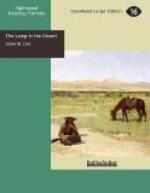As for Stella, she still told herself that she would escape with her freedom. He would speak, she was convinced, before she left. She even sometimes told herself that after what had passed between them, it was almost incumbent upon him to speak. But she believed that he would accept her refusal philosophically, possibly even with relief. She restrained herself forcibly from dwelling upon the thought of him. Again and again she reminded herself that he trod the way of ambition. His heart was given to his work, and a man may not serve two masters. He cared for her, probably, but in a calm, judicial fashion that could never satisfy her. If she married him she would come second—and a very poor second—to his profession. And so she did not mean to marry him. And so she checked the fevered memory of passionate kisses that had burned her to the soul, of arms that had clasped and held her by a force colossal. That had been only the primitive man in him, escaped for the moment beyond his control—the primitive man which he had well-nigh succeeded in stifling with the bonds of his servitude. Had he not told her that he would have given all he had to forget that single wild lapse into savagery? She was sure that he despised himself for it. He would never for an instant suffer such an impulse again. He did not really love her. It was not in him to love any woman. He would make her a formal offer of marriage, and when she had refused him he would dismiss the matter from his mind and return to his work undisturbed.
So she schooled herself to make her plans, leaving him out of the reckoning, telling herself ever that her newly restored freedom was too dear ever to be sacrificed again. In Mrs. Ralston’s company she attended some of the social gatherings of the station, but she took no keen pleasure in them. She disliked Lady Harriet, she distrusted Mrs. Burton, and more often than not she remained away. The coming Christmas festivities did not attract her. She held aloof till Tommy who was in the thick of everything suddenly and vehemently demanded her presence.
“It’s ridiculous to be so stand-offish,” he maintained. “Don’t let ’em think you’re afraid of ’em! Come anyway to the moonlight picnic at Khanmulla on Christmas Eve! It’s going to be no end of a game.”
Stella smiled a little. “Do you know, Tommy, I think I’d rather go to bed?”
“Absurd!” declared Tommy. “You used to be much more sporting.”
“I wasn’t a widow in those days,” Stella said.
“What rot! What damn’ rot!” cried Tommy wrathfully.
“There is no altering the fact,” said Stella.
He left her, fuming.
That evening as she sat on the Club verandah with Mrs. Ralston, watching some tennis, Monck came up behind her and stood against the wall smoking a cigarette.
He did not speak for some time and after a word of greeting Stella turned back to the play. But presently Mrs. Ralston got up and went away, and after an interval Monck came silently forward and took the vacant seat.




